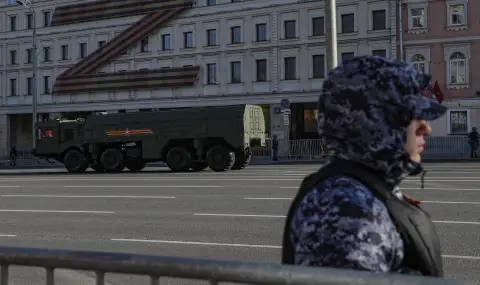A day before Vladimir Putin was officially inaugurated as Russia's president for the fifth time, the Russian Defense Ministry announced that in "near future" exercises with tactical nuclear weapons will be held near the Ukrainian border. They would be the first since Russia's full-scale invasion of Ukraine. The exercises will be conducted by missile formations of the Southern Military District of Russia with the participation of the aviation and naval forces with the aim of "increasing the readiness of non-strategic nuclear forces". In addition to the Russian regions, the Southern Military District of Russia includes Crimea, annexed in 2014, and four regions of southeastern Ukraine, partially occupied in 2022.
The threat of nuclear war and criticism of the West
Representatives of Western countries have repeatedly criticized the Russian leadership for nuclear threats. However, President Vladimir Putin has not openly threatened a nuclear strike, although he has warned the West of the possibility of nuclear war in the event of a direct confrontation with Russia.
At the same time, former Russian President and Deputy Chairman of the Security Council of the Russian Federation Dmitry Medvedev has done this repeatedly. On May 6, he made another such statement, linking the decision to conduct exercises with tactical nuclear weapons to the ongoing discussion in the West about the possibility of sending ground troops to Ukraine.
And the spokesman of the Russian President Dmitry Peskov connected these exercises with the same occasion and even mentioned the French President Emmanuel Macron in particular. Peskov called this a "new round of escalation of tension".
What are tactical nuclear weapons
Tactical nukes differ from strategic nukes in that they have less power and range. They can be artillery, but most often they are ballistic and cruise missiles. They are launched from systems that can carry both conventional and nuclear warheads.
Tactical nuclear weapons are nuclear warheads for land-based missile systems with a range of up to 500 km, as well as for sea- or air-based systems with a range of up to 600 km. But there are no clear classification boundaries, and some sources include tactical nuclear weapons and the new Russian "Calibre" cruise missiles. and the hypersonic missiles "Dagger" - with a range of up to several thousand kilometers.
"From a military point of view, it makes no sense"
The experts interviewed by DV are unanimous in their opinion that the use of nuclear weapons in Ukraine is unlikely and pointless. "From a military point of view, under any circumstances, Russia's use of nuclear weapons in Ukraine makes no sense," said Pavel Podvig, a senior researcher at the UN Institute for Disarmament Studies. He emphasizes that "this situation has not changed in any way".
Russia can practice not strikes, but "the deployment procedure, since in a normal situation non-strategic warheads are in storage - separate from the missiles and aircraft that can deliver them," says Pavel Podvig. He hopes that "working out these procedures is done on training models - at least for safety reasons".
"There never was" plans to use nuclear weapons in Ukraine, says Nikolai Sokov, a lead researcher at the Vienna-based Center for Nuclear Disarmament and Non-Proliferation. According to him, this was not the case even in the fall of 2022, when the Russian army was withdrawing from Kharkiv and Kherson regions. The Russian army now outnumbers the Ukrainians in many ways and is advancing, capturing more and more territory in eastern Ukraine. Moreover, Kiev expects Moscow to expand its attacks.
The reason, according to him, is obviously different. "Nuclear Escalation" is a phrase that has been feared in the West since the beginning of the Russian invasion. It is with such threats from Moscow that Western politicians and experts explain the fact that the supply of weapons to Ukraine is proceeding slowly and with restrictions.
The risk of mistakes and expansion of war
According to Matthew Buleg from the American think tank "Wilson", Moscow is still counting on this. He is not sure that Russia's nuclear exercises are "related only to the position of France". According to him, they are "part of a long cycle of constant intimidation" in order to break the West's resolve on Ukraine. In addition, the exercises are related to President Putin's desire to show himself as a "strong leader" in the context of "self-appointment" and on the eve of May 9, says Bouleg. Overall, he believes that "the main problem is not intimidation, but the risk of misjudgment and tactical errors.
Nikolay Sokov emphasizes that "the situation is unstable" and "the escalation is very real" - because of Macron's statements. "The question is not even how many NATO soldiers will be there, but whether they will be directly on the front line," says Sokov. According to him, if the French military appears in Ukraine, they will be a priority target: "Russia will redouble its efforts to try to eliminate them - with conventional weapons." "What will Macron do?" asks Sokov and reminds that France is a nuclear power. On Monday, May 6, the French Foreign Ministry denied sending troops to Ukraine, calling it a "disinformation campaign".
Sokov sees the danger not in the fact that "Russia will want to use nuclear weapons". According to him, "Russia will want to bring the issue to the point where the West, NATO, actually face the question of what will be used now". According to the expert, the issue may not affect the territory of Ukraine, but "and directly the countries of the West".
Author: Roman Goncharenko
